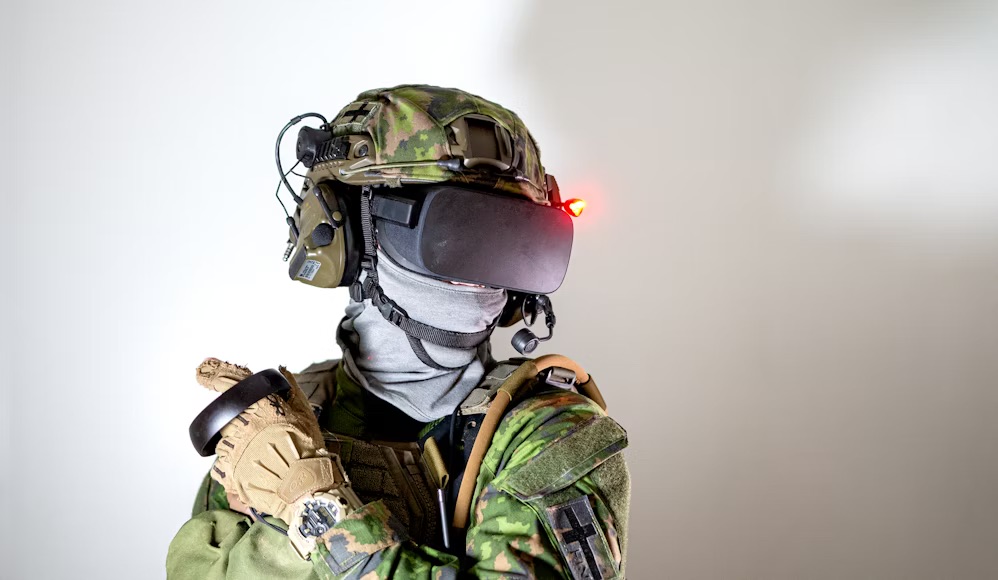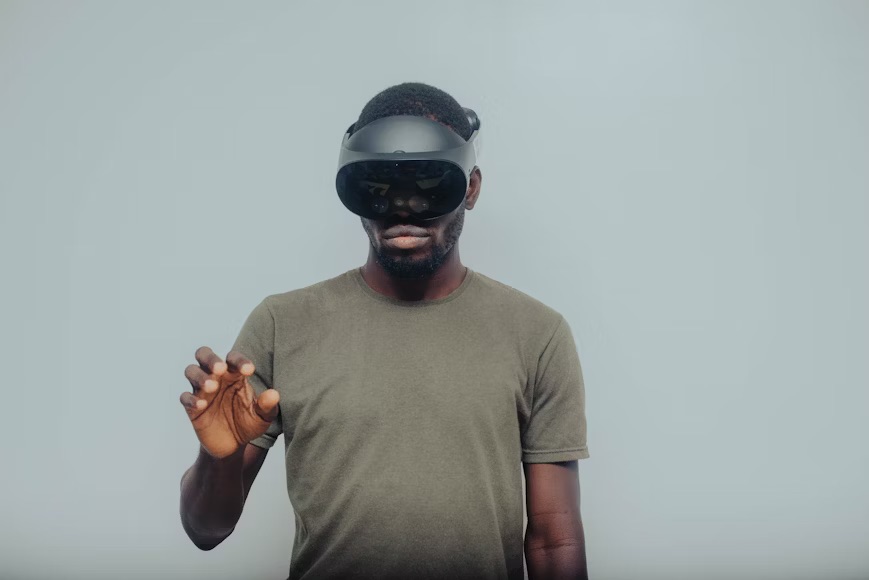


Military personnel and veterans are at elevated risk for stress-related conditions such as post-traumatic stress disorder (PTSD), anxiety, and depression due to exposure to combat and high-intensity environments. In recent years, Virtual Reality (VR) has emerged not only as a tool for exposure-based interventions aimed at treating PTSD, but also as an innovative platform for delivering immersive experiences in relaxation, meditation, and mindfulness. These VR-based approaches can assist in managing negative emotional states, enhancing mood regulation, and contributing to both the prevention and treatment of combat-related stress disorders.
Traditional therapeutic approaches are sometimes limited by engagement issues, stigma, or insufficient personalization. In contrast, Virtual Reality (VR) offers a non-invasive, engaging, and adaptable environment that enhances emotional regulation and coping capacities.
Military personnel and veterans (often considered digital natives) are generally well-acquainted with advanced technologies, which increases their receptivity and motivation to engage with immersive interventions. VR presents multisensory environments that are more vivid and emotionally evocative than those individuals can generate through imagination or memory alone, leading to deeper and more enduring emotional experiences. These immersive settings facilitate parasympathetic nervous system responses (e.g., lowered heart rate, reduced muscle tension), thereby promoting deep relaxation.
Furthermore, VR provides secure and controlled scenarios where users can practice relaxation, meditation, and mindfulness techniques at their own pace and repeat them as often as necessary. Importantly, there is growing scientific evidence that relaxation skills learned in virtual environments generalize effectively to real-world contexts, empowering soldiers to apply these techniques in their daily routines and even in high-stress, real-time combat scenarios.
Recent research has provided increasing evidence supporting the feasibility, acceptability, and effectiveness of Virtual Reality (VR)-based interventions for promoting relaxation, emotional regulation, and mindfulness among veterans and military personnel. Notably, the U.S. Department of Veterans Affairs (VA) has begun implementing VR programs across multiple medical centers as part of its efforts to support veterans in managing pain and anxiety. Preliminary outcomes from these initiatives are promising, with reports of reduced pain intensity and improved mood states among participants during and following VR sessions (Sprey, 2023). In parallel, the U.S. Air Force has introduced VR-based relaxation technologies, using Relax VR to enhance well-being among service members. As noted by Dr. Malorie Schneider, Clinical Psychologist at the 720th Special Tactics Group, “We have had our personnel enjoy the relaxation and meditation with the Relax VR. Our service members are loving this device as a way to de-stress.”
In the area of research, Rawlins et al. (2021) reported that Virtual Reality (VR), as a non-pharmacological adjunct or alternative intervention, appears to be a viable and effective option for enhancing pain management and reducing anxiety among veteran populations. These benefits were observed across a wide range of age groups and among individuals with varying levels of medical acuity and chronicity.
Liu et al. (2023) conducted a preliminary study evaluating the effects of a 10-minute VR-guided meditation session among U.S. veterans experiencing stress and chronic pain. Participants exhibited significant reductions in self-reported pain and stress, as well as measurable decreases in heart rate and both systolic and diastolic blood pressure following the session. Additionally, veterans reported high levels of satisfaction with the intervention, and adverse effects were minimal, indicating both clinical promise and tolerability.
In a related study, Appel et al. (2022) explored the implementation of VR therapy in a long-term care facility for veterans with dementia. The primary objective was to reduce responsive behaviors among residents with varying degrees of cognitive and physical impairment. Findings demonstrated that VR therapy was not only feasible and well-tolerated, but also perceived as enjoyable by participants. Furthermore, facility staff continued to incorporate VR sessions into routine programming beyond the study period, suggesting sustained utility and successful integration into long-term care practices.
Similarly, Van Doren et al. (2024) examined a self-guided VR mindfulness intervention within a residential substance use treatment program for veterans. The study reported that the intervention was both feasible to implement and highly acceptable to participants and clinical staff. Engagement in VR sessions was associated with reductions in negative affect and increased states of calm and relaxation.
Further evidence comes from Rice et al. (2024), who conducted a comparative study on mindfulness meditation training delivered in-person and via a virtual world among 259 U.S. active-duty service members and veterans. Participants were randomized into three groups: in-person mindfulness training, virtual-world-based training, or a waitlist control. Results showed a 10% increase in self-compassion in the in-person group and a 14% increase in the virtual world group, with no significant change observed in the control group. These findings suggest that virtual environments may offer equivalent or even superior outcomes compared to traditional delivery formats for psychological well-being enhancement.
Additionally, an ongoing clinical trial is evaluating the feasibility and accessibility of delivering the VA Compassionate Awareness Learning Module (VA CALM)—a mindfulness-based program specifically developed for veterans—to individuals with spinal cord injuries (SCI) via VR. The study aims to adapt the intervention to meet the unique accessibility needs of this population and to assess whether VR can serve as an effective platform for mindfulness training. As of this writing, results from this trial have not yet been published.

The multisensory nature of VR environments facilitates the integration of diverse sensory modalities (including olfactory, auditory, and verbal stimuli) to deepen immersion and enhance therapeutic outcomes. Products such as Relax VR exemplify this integrative approach by combining visually calming environments with essential oils (aromatherapy), binaural beats, and guided meditations. For military personnel and veterans, populations that often benefit from personalized, non-invasive interventions to address stress-related conditions, this multisensory design offers significant therapeutic potential. The following section reviews the current scientific literature on the efficacy of each of these components when applied individually within military and veteran populations.
Since 2006, the David Lynch Foundation has actively supported the dissemination of Transcendental Meditation (TM) practices among military personnel and veterans, funding pilot programs and clinical initiatives in universities and U.S. Department of Veterans Affairs (VA) centers. In parallel, a growing body of empirical research supports the efficacy of meditation-based interventions (particularly mindfulness and mantra-based practices) for addressing PTSD and related symptoms in military populations.
Bellehsen et al. (2022) conducted a RCT involving 40 veterans with PTSD and demonstrated that TM led to significant reductions in PTSD symptomatology and comorbid psychological distress. Similarly, Nidich et al. (2018), in a larger randomized trial, found that TM was non-inferior to prolonged exposure therapy in reducing PTSD symptoms, offering a valuable alternative for veterans who are unable or unwilling to engage in exposure-based interventions.
A multisite randomized controlled trial (RCT) conducted by Davis et al. (2019) compared Mindfulness-Based Stress Reduction (MBSR) to present-centered group therapy among veterans with PTSD. Findings indicated that MBSR led to significantly greater reductions in self-reported PTSD symptoms. Complementing these results, Stanley a& Jha (2009) implemented a mindfulness-based attention training program with Marines prior to deployment. Participants demonstrated improved working memory, mood, and resilience under stress, with stronger cognitive outcomes observed among those with higher engagement.
Other forms of meditation have also demonstrated clinical promise. Bormann et al. (2013) conducted an RCT in which 146 veterans participated in a mantram repetition program (a portable mantra-based meditation practice) in conjunction with treatment-as-usual. Compared to controls, participants in the intervention group showed significantly greater reductions in PTSD symptoms and improvements in depressive symptoms and spiritual well-being.
Breathing-based meditation has similarly shown benefits in military personnel. Seppälä et al. (2014) conducted a longitudinal RCT with 21 male veterans using Sudarshan Kriya Yoga, a structured breathing-based practice. Participants experienced large reductions in PTSD symptoms, anxiety, respiration rate, and startle response, with these benefits persisting at one-year follow-up.
Together, these studies suggest that meditation techniques (including mindfulness-based, mantra-based, and breathing-centered practices) represent effective, well-tolerated, and scalable interventions for improving psychological well-being among military personnel and veterans.
To date, only a limited number of studies have directly examined the use of aromatherapy or essential oils in military and veteran populations. However, preliminary findings suggest that these interventions may offer benefits in reducing anxiety, improving sleep and mood, and decreasing avoidance behaviors.
Freeman et al. (2019) conducted an evidence map for the Veterans Health Administration (VHA) to assess the effectiveness of aromatherapy and essential oils across various health conditions. The primary objective was to inform and support clinical decision-making regarding the integration of these complementary therapies within the VHA system. The review identified moderate-quality evidence supporting the use of inhaled aromatherapy, particularly for reducing pain in conditions such as dysmenorrhea, as well as for alleviating symptoms of anxiety, stress, and sleep disturbances in select adult populations.
In a more targeted research, Daniel and Zolnikov (2023) carried out a qualitative study involving 12 participants, including military personnel, who presented with symptoms of post-traumatic stress disorder (PTSD). Participants inhaled bergamot essential oil four times daily over a two-week period. Self-reported outcomes included a calming effect, improved sleep, reduced anxiety, enhanced mood and concentration, and a decrease in avoidance behaviors. Notably, participants indicated that the intervention helped alleviate symptoms associated with the PTSD clusters of arousal, negative mood, and avoidance. Importantly, a randomized controlled trial is currently underway to further explore the feasibility and effectiveness of aromatherapy in a veteran population. The VETERANS (Veterans Enhanced Recovery Using Integrative Treatments Around Surgery) trial is being conducted at the Durham VA Medical Center and evaluates integrative interventions (including aromatherapy, music therapy, and battlefield acupuncture) for postoperative recovery in veterans
Preliminary evidence suggests that binaural beats may serve as a promising non-pharmacological intervention for reducing stress and tinnitus-related distress in military populations.
Gantt et al. (2017) conducted a controlled study involving 74 military service members experiencing post-deployment stress. Participants who listened to music embedded with theta-frequency binaural beats demonstrated significant reductions in both physiological and psychological indicators of stress. In contrast, those who listened to music without embedded beats exhibited the opposite outcomes, indicating the potential added value of BBT over music alone. Similarly, Moosapour Bardsiri et al. (2023) conducted a randomized controlled trial with 60 male military personnel suffering from chronic tinnitus due to acoustic trauma. Participants exposed to alpha-frequency binaural beats experienced significantly greater reductions in tinnitus-related distress compared to those who listened to music without binaural beats. The most notable improvements were observed in the emotional and behavioral subscales, highlighting the potential of BBT to alleviate psychological burdens associated with chronic tinnitus in military settings.
Virtual Reality (VR) is a powerful adjunctive tool for promoting relaxation, mindfulness, and meditation among military personnel and veterans. By offering immersive, engaging environments, VR can facilitate emotional self-regulation and reduce psychological distress, thereby complementing traditional therapeutic approaches.
Beyond visual immersion, the multisensory capabilities of VR products (including the integration of guided meditation, binaural beats, and essential oils) enable a deeper and more individualized therapeutic experience. These modalities are supported by emerging evidence demonstrating their efficacy in military and veteran populations, particularly in alleviating symptoms of PTSD, anxiety, sleep disturbances, and stress-related physiological responses.
In sum, VR-based relaxation interventions represent a promising frontier in the personalized mental health care of military personnel and veterans. Their application may enhance psychological resilience, promote emotional well-being, and support reintegration, recovery, and overall quality of life for those impacted by the psychological demands of military service.
Relax VR offers a 10% discount to active-duty military, veterans and their immediate families. Contact us to provide your proof of ID and receive a discount code.
Appel, L., Appel, E., Kisonas, E., Lewis, S., & Sheng, L. Q. (2022). Virtual reality for veteran relaxation: Can VR therapy help veterans living with dementia who exhibit responsive behaviors? Frontiers in Virtual Reality, 2, 724020. https://doi.org/10.3389/frvir.2021.724020
Bellehsen, M., Stoycheva, V., Cohen, B. H., & Nidich, S. (2022). A pilot randomized controlled trial of Transcendental Meditation as treatment for posttraumatic stress disorder in veterans. Journal of Traumatic Stress, 35(1), 22–31. DOi: https://doi.org/10.1002/jts.22665
Bormann, J. E., Thorp, S. R., Wetherell, J. L., Golshan, S., & Lang, A. J. (2013). Meditation-based mantram intervention for veterans with posttraumatic stress disorder: A randomized trial. Psychological Trauma: Theory, Research, Practice, and Policy, 5(3), 259–267. DOI: https://doi.org/10.1037/a0027522
Daniel, D. R., & Zolnikov, T. R. (2023). The Use of Bergamot Essential Oil for PTSD Symptomology: A Qualitative Study. American Journal of Qualitative Research, 7(4), 1-32. DOI: https://doi.org/10.29333/ajqr/13596
Davis, L. L., Whetsell, C., Hamner, M. B., Carmody, J., Rothbaum, B. O., Allen, R. S., Bartolucci, A. B. P. P., Southwick, S. M., & Bremner, J. D. (2019). A multisite randomized controlled trial of mindfulness-based stress reduction in the treatment of posttraumatic stress disorder. Psychiatric Research and Clinical Practice, 1(2), 39–48. DOI: https://doi.org/10.1176/appi.prcp.20180002
Durham VA Medical Center. (n.d.). Veterans Enhanced Recovery Using Integrative Treatments Around Surgery (VETERANS): aromatherapy, music therapy, battlefield acupuncture (ClinicalTrials.gov Identifier: NCT06333938). ClinicalTrials.gov. Available at: https://trials.arthritis.org/trials/NCT06333938
Freeman, M., Ayers, C. K., Peterson, C., & Kansagara, D. (2019). Aromatherapy and essential oils: A map of the evidence (VA ESP Project No. 05‑225). Evidence Synthesis Program, Health Services Research & Development Service, U.S. Department of Veterans Affairs. https://www.ncbi.nlm.nih.gov/books/NBK551020/
Gantt, M. A., Dadds, S., Burns, D. S., Glaser, D., & Moore, A. D. (2017). The effect of binaural beat technology on the cardiovascular stress response in military service members with postdeployment stress. Journal of Nursing Scholarship, 49(4), 411–420. https://doi.org/10.1111/jnu.12304
Liu, K., Madrigal, E., Chung, J. S., Parekh, M., Kalahar, C. S., Nguyen, D., Timmerman, M., & Harris, O. A. (2023). Preliminary study of virtual-reality-guided meditation for veterans with stress and chronic pain. Federal Practitioner, 40(4), 160–165. https://pubmed.ncbi.nlm.nih.gov/34559692
Moosapour Bardsiri, M., Cheraghipour, P., Irani, M., Mousavi, S. M., & Ghazi Mirsaeed, S. S. (2023). Investigating the effect of binaural beat stimulation on the annoyance of tinnitus in military personnel. Auditory and Vestibular Research, 32(1), 19–25. https://doi.org/10.18502/avr.v32i1.11314
Nidich, S., Mills, P. J., Rainforth, M., Heppner, P., Schneider, R. H., Rosenthal, N. E., Salerno, J., Gaylord-King, C., & Rutledge, T. (2018). Non-trauma-focused meditation versus exposure therapy in veterans with post-traumatic stress disorder: A randomised controlled trial. The Lancet Psychiatry, 5(12), 975–986. DOI: https://doi.org/10.1016/S2215-0366(18)30384-5
Rawlins, C. R., Veigulis, Z., Hebert, C., Curtin, C., & Osborne, T. F. (2021). Effect of immersive virtual reality on pain and anxiety at a Veterans Affairs health care facility. Frontiers in Virtual Reality, 2, 719681. https://doi.org/10.3389/frvir.2021.719681
Rice, V. J. B., Schroeder, P., & Allison, S. C. (2024). Effects of mindfulness meditation training offered in-person and via a virtual world on self-compassion: A study with U.S. military active duty and veterans. Work, 76(1), 145–153. https://doi.org/10.3233/WOR-230645
Seppälä, E. M., Nitschke, J. B., Tudorascu, D. L., Hayes, A., Goldstein, M. R., Nguyen, D. T., Perlman, D., & Davidson, R. J. (2014). Breathing-based meditation decreases posttraumatic stress disorder symptoms in U.S. military veterans: A randomized controlled longitudinal study. Journal of Traumatic Stress, 27(4), 397–405. https://doi.org/10.1002/jts.21936
Sprey, E. (2023, May 11). Virtual reality technology helps Veterans in pain. VA Research Currents. https://www.research.va.gov/currents/0523-Virtual-reality-technology-helps-Veterans-in-pain.cfm
Stanley, E. A. & Jha, A. P. (2009). Mind fitness: Improving operational effectiveness and building warrior resilience. Joint Force Quarterly, 55, 144-151.
U.S. National Library of Medicine. (2025). Virtual reality mindfulness training for veterans with SCI and chronic pain (ClinicalTrials.gov Identifier: NCT06587607). ClinicalTrials.gov. https://clinicaltrials.gov/ct2/show/NCT06587607
Van Doren, N., Ng, H., Rawat, E., McKenna, K. R., & Blonigen, D. M. (2024). Virtual reality mindfulness training for veterans in residential substance use treatment: Pilot study of feasibility and acceptability. Journal of Substance Abuse Treatment, 158, 209315. DOI: https://doi.org/10.1016/j.josat.2024.209315